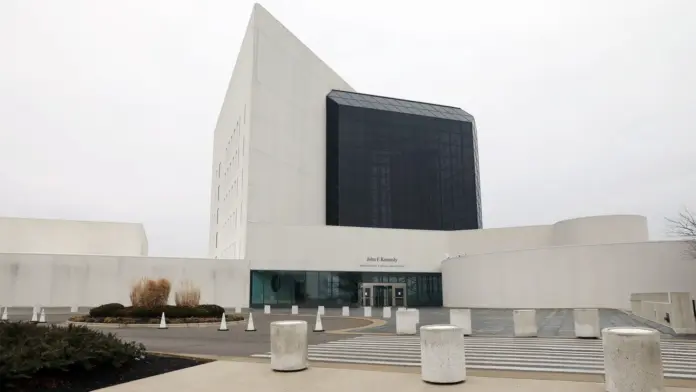Why the JFK Library Shut Down in Boston: Layoffs & Federal Budget Cuts – Visitors and staff alike were shocked by the sudden closure of the John F. Kennedy Presidential Library and Museum in Dorchester, Boston. On a Tuesday afternoon, the library shut its doors after layoffs of several employees following an executive order from the White House. The closure painfully reminds us that federal decisions can hit hard on our public institutions.
The Unexpected Shutdown
On the day of the closure, most visitors appeared baffled as they reached the JFK Library only to find the museum shut by an executive order-notices had been placed on the door. “There were just signs probably five or six signs over other information that just said closed due to executive order. The doors were locked and the lights were off,” said JY Schaefer, a visitor.
The fateful decision to close the library occurred as a result of a cost-cutting plan from President Trump. The decision would see five employees, who had remained in their initial employment contracts for not more than a year, thrown onto the street. Former Congressman Joe Kennedy III expressed his disgust, saying that they had gotten a call from the National Archives regarding the dismissals. He referred to the jobs as information or visitor-facing jobs that were crucial for the daily operation of the library.
Also read: Trump’s IVF Executive Order: Affordable Fertility Access
Lead Staff and Visitors
The emotional impact of the layoffs was overwhelmingly clear. Reports indicated that employees were seen exiting before the close meeting with tears streaming down their faces. One worker called the atmosphere “surprising, perplexing, looking for answers.” The closure of the library not only altered its operations but also left a lot of visitors greatly disappointed and confused.
Among those affected were five probationary employees who primarily worked in museum admissions. With their sudden dismissal, the library found itself without enough staff to operate, prompting the decision to close for the day. The JFK Library Foundation, the privately funded branch supporting the institution, expressed their devastation over the layoffs and pledged to continue supporting their colleagues.
State Decisions and Cultural Institutions
The JFK Library and the events surrounding its closing symbolize more than just questions of how government decisions can affect cultural institutions. Often libraries and museums depend on federal funding to operate, and when political decisions create budget cuts and lay off people, the fallout is often tragic. It begs the question of what the future holds for such institutions regarding staying open and serving the general public.
Governor Maura Healey condemned the decision, saying that those cuts pushed by Trump and his administration have hurt a cultural icon that is an economic driver for Massachusetts. Many feel that providing a budget cut and maintaining government efficiency by targeting libraries and cultural institutions is misguided. “We have a problem when we close libraries down in the name of government efficiency,” Kennedy said.
Also read: SNL’s Black Jeopardy Sketch Sparks MAGA Controversy
Reopening and Future Implications
Despite the sudden closure, the JFK Library announced it would reopen the following day. However, the uncertainty surrounding the staff situation remains. It is unclear who will be working there, as the layoffs raised concerns about the future staffing levels at the library.
This incident is not isolated; it reflects a growing trend of government actions that can disrupt public services. The looming threat of additional budget cuts and staffing reductions only adds to the anxiety surrounding the operation of cultural institutions. The JFK Library, dedicated to the legacy of President Kennedy, is a vital part of the community and the broader historical narrative of the United States.
Reflections on the Library’s Role
The JFK Library is not just a museum; it is a space for learning, engagement, and reflection on the life of one of America’s most celebrated presidents. Its closure, even for a brief period, sends a message about the vulnerability of cultural institutions in the face of political decisions. The library, designed by renowned architect I.M. Pei, has been a key historical and cultural landmark since its opening in 1979.
As discussions surrounding government efficiency and budget cuts continue, the fate of institutions like the JFK Library hangs in the balance. The community’s response to this incident may shape future policies and funding decisions, especially as more citizens recognize the importance of preserving access to cultural resources.








